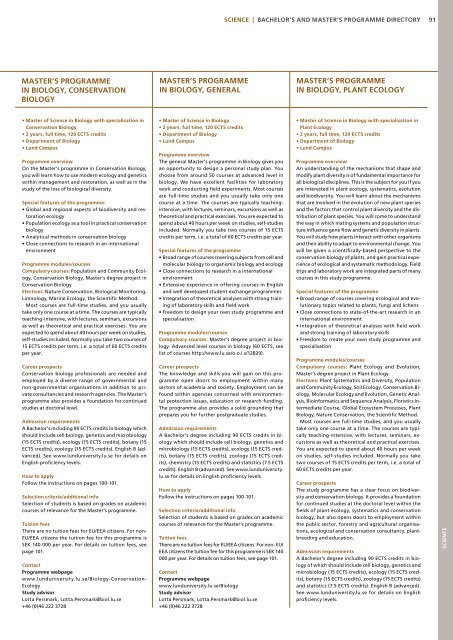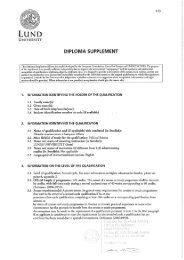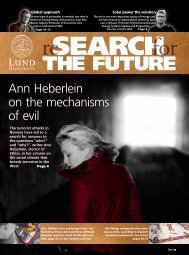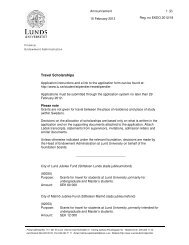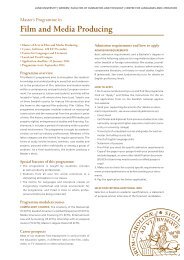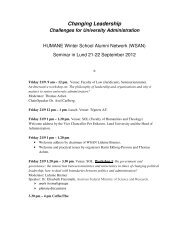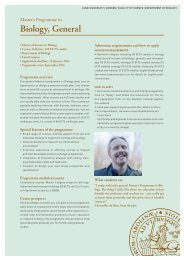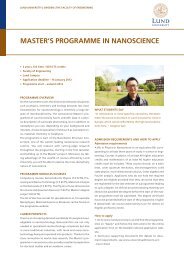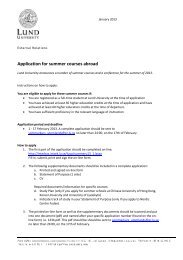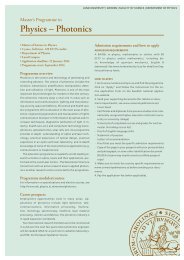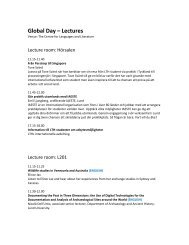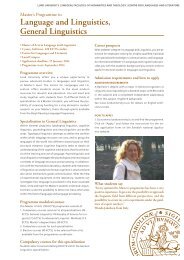Download our 2014/15 international student ... - Lund University
Download our 2014/15 international student ... - Lund University
Download our 2014/15 international student ... - Lund University
You also want an ePaper? Increase the reach of your titles
YUMPU automatically turns print PDFs into web optimized ePapers that Google loves.
SCIENCe | Bachelor’s and Master’s programme directory91Master’s Programmein Biology, ConservationBiologyMaster’s Programmein Biology, GeneralMaster’s Programmein Biology, Plant Ecology• Master of Science in Biology with specialisation inConservation Biology• 2 years, full time, 120 ECTS credits• Department of Biology• <strong>Lund</strong> CampusProgramme overviewOn the Master’s programme in Conservation Biology,you will learn how to use modern ecology and geneticswithin management and restoration, as well as in thestudy of the loss of biological diversity.Special features of the programme:• Global and regional aspects of biodiversity and restorationecology• Population ecology as a tool in practical conservationbiology• Analytical methods in conservation biology• Close connections to research in an <strong>international</strong>environmentProgramme modules/c<strong>our</strong>sesCompulsory c<strong>our</strong>ses: Population and Community Ecology,Conservation Biology, Master’s degree project inConservation BiologyElectives: Nature Conservation, Biological Monitoring,Limnology, Marine Ecology, the Scientific Method.Most c<strong>our</strong>ses are full-time studies, and you usuallytake only one c<strong>our</strong>se at a time. The c<strong>our</strong>ses are typicallyteaching-intensive, with lectures, seminars, excursionsas well as theoretical and practical exercises. You areexpected to spend about 40 h<strong>our</strong>s per week on studies,self-studies included. Normally you take two c<strong>our</strong>ses of<strong>15</strong> ECTS credits per term, i.e. a total of 60 ECTS creditsper year.Career prospectsConservation biology professionals are needed andemployed by a diverse range of governmental andnon-governmental organisations in addition to privateconsultancies and research agencies. The Master’sprogramme also provides a foundation for continuedstudies at doctoral level.Admission requirementsA Bachelor’s including 90 ECTS credits in biology whichshould include cell biology, genetics and microbiology(<strong>15</strong> ECTS credits), ecology (<strong>15</strong> ECTS credits), botany (<strong>15</strong>ECTS credits), zoology (<strong>15</strong> ECTS credits). English B (advanced).See www.lunduniversity.lu.se for details onEnglish proficiency levels.How to applyFollow the instructions on pages 100-101.Selection criteria/additional infoSelection of <strong>student</strong>s is based on grades on academicc<strong>our</strong>ses of relevance for the Master’s programme.Tuition feesThere are no tuition fees for EU/EEA citizens. For non-EU/EEA citizens the tuition fee for this programme isSEK 140 000 per year. For details on tuition fees, seepage 101.ContactProgramme webpagewww.lunduniversity.lu.se/Biology-Conservation-EcologyStudy advisorLotta Persmark, Lotta.Persmark@biol.lu.se+46 (0)46 222 3728• Master of Science in Biology• 2 years, full time, 120 ECTS credits• Department of Biology• <strong>Lund</strong> CampusProgramme overviewThe general Master’s programme in Biology gives youan opportunity to design a personal study plan. Youchoose from around 50 c<strong>our</strong>ses at advanced level inbiology. We have excellent facilities for laboratorywork and conducting field experiments. Most c<strong>our</strong>sesare full-time studies and you usually take only onec<strong>our</strong>se at a time. The c<strong>our</strong>ses are typically teachingintensive,with lectures, seminars, excursions as well astheoretical and practical exercises. You are expected tospend about 40 h<strong>our</strong>s per week on studies, self-studiesincluded. Normally you take two c<strong>our</strong>ses of <strong>15</strong> ECTScredits per term, i.e. a total of 60 ECTS credits per year.Special features of the programme• Broad range of c<strong>our</strong>ses covering subjects from cell andmolecular biology to organismic biology and ecology• Close connections to research in a <strong>international</strong>environment• Extensive experience in offering c<strong>our</strong>ses in Englishand well developed <strong>student</strong> exchange programmes• Integration of theoretical analyses with strong trainingof laboratory skills and field work• Freedom to design y<strong>our</strong> own study programme andspecialisationProgramme modules/c<strong>our</strong>sesCompulsory c<strong>our</strong>ses: Master’s degree project in biology.Advanced level c<strong>our</strong>ses in biology (60 ECTS, seelist of c<strong>our</strong>ses http://www.lu.se/o.o.i.s/12829).Career prospectsThe knowledge and skills you will gain on this programmeopen doors to employment within manysectors of academia and society. Employment can befound within agencies concerned with environmentalprotection issues, education or research funding.The programme also provides a solid grounding thatprepares you for further postgraduate studies.Admission requirementsA Bachelor’s degree including 90 ECTS credits in biologywhich should include cell biology, genetics andmicrobiology (<strong>15</strong> ECTS credits), ecology (<strong>15</strong> ECTS credits),botany (<strong>15</strong> ECTS credits), zoology (<strong>15</strong> ECTS credits),chemistry (<strong>15</strong> ECTS credits) and statistics (7.5 ECTScredits). English B (advanced). See www.lunduniversity.lu.se for details on English proficiency levels.How to applyFollow the instructions on pages 100-101.Selection criteria/additional infoSelection of <strong>student</strong>s is based on grades on academicc<strong>our</strong>ses of relevance for the Master’s programme.Tuition feesThere are no tuition fees for EU/EEA citizens. For non- EU/EEA citizens the tuition fee for this programme is SEK 140000 per year. For details on tuition fees, see page 101.ContactProgramme webpagewww.lunduniversity.lu.se/BiologyStudy advisorLotta Persmark, Lotta.Persmark@biol.lu.se+46 (0)46 222 3728• Master of Science in Biology with specialisation inPlant Ecology• 2 years, full time, 120 ECTS credits• Department of Biology• <strong>Lund</strong> CampusProgramme overviewAn understanding of the mechanisms that shape andmodify plant diversity is of fundamental importance forall biological disciplines. This is the subject for you if youare interested in plant ecology, systematics, evolutionand biodiversity. You will learn about the mechanismsthat are involved in the evolution of new plant speciesand the factors that control plant diversity and the distributionof plant species. You will come to understandthe way in which mating systems and population structureinfluence gene flow and genetic diversity in plants.You will study how plants interact with other organismsand their ability to adapt to environmental change. Youwill be given a scientifically-based perspective to theconservation biology of plants, and gain practical experienceof ecological and systematic methodology. Fieldtrips and laboratory work are integrated parts of manyc<strong>our</strong>ses in this study programme.Special features of the programme• Broad range of c<strong>our</strong>ses covering ecological and evolutionarytopics related to plants, fungi and lichens• Close connections to state-of-the-art research in an<strong>international</strong> environment• Integration of theoretical analyses with field workand strong training of laboratory skills• Freedom to create y<strong>our</strong> own study programme andspecialisationProgramme modules/c<strong>our</strong>sesCompulsory c<strong>our</strong>ses: Plant Ecology and Evolution,Master’s degree project in Plant Ecology.Electives: Plant Systematics and Diversity, Populationand Community Ecology, Soil Ecology, Conservation Biology,Molecular Ecology and Evolution, Genetic Analysis,Bioinformatics and Sequence Analysis, Floristics IntermediateC<strong>our</strong>se, Global Ecosystem Processes, PlantBiology, Nature Conservation, the Scientific Method.Most c<strong>our</strong>ses are full-time studies, and you usuallytake only one c<strong>our</strong>se at a time. The c<strong>our</strong>ses are typicallyteaching-intensive, with lectures, seminars, excursionsas well as theoretical and practical exercises.You are expected to spend about 40 h<strong>our</strong>s per weekon studies, self-studies included. Normally you taketwo c<strong>our</strong>ses of <strong>15</strong> ECTS credits per term, i.e. a total of60 ECTS credits per year.Career prospectsThe study programme has a clear focus on biodiversityand conservation biology. It provides a foundationfor continued studies at the doctoral level within thefields of plant ecology, systematics and conservationbiology, but also opens doors to employment withinthe public sector, forestry and agricultural organisations,ecological and conservation consultancy, plantbreedingand education.Admission requirementsA Bachelor’s degree including 90 ECTS credits in biologyof which should include cell biology, genetics andmicrobiology (<strong>15</strong> ECTS credits), ecology (<strong>15</strong> ECTS credits),botany (<strong>15</strong> ECTS credits), zoology (<strong>15</strong> ECTS credits)and statistics (7.5 ECTS credits). English B (advanced).See www.lunduniversity.lu.se for details on Englishproficiency levels.SCIENCE


